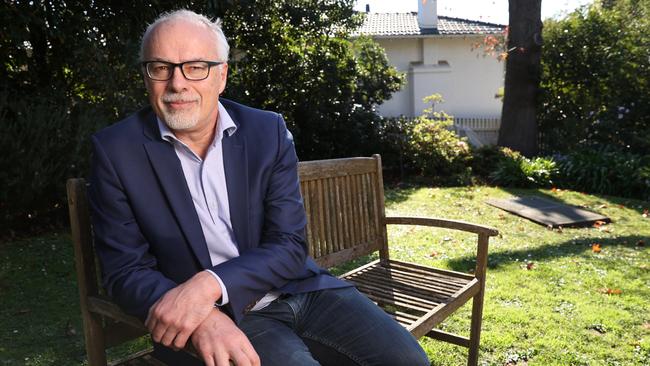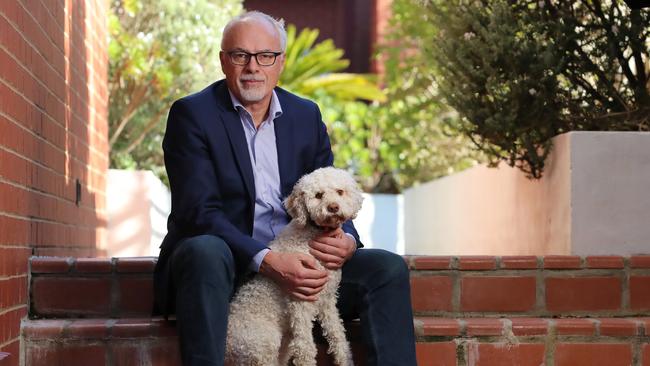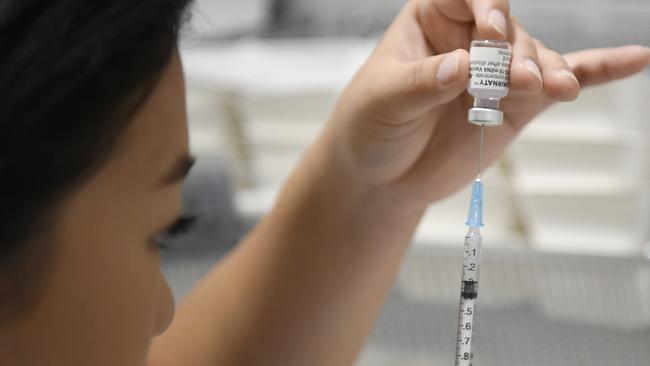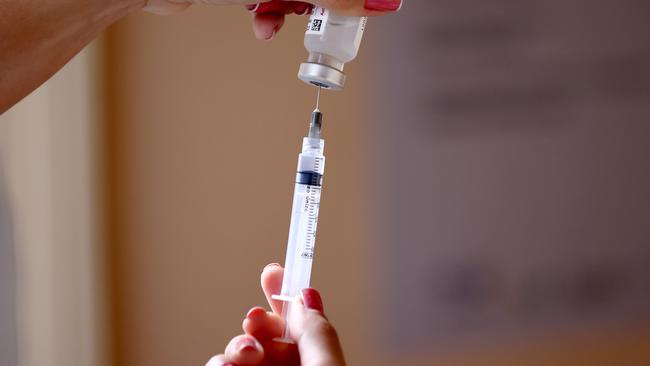Epidemiologist Tony Blakely says children should be vaccinated against Covid
A top virus expert says children “will have to be vaccinated” if we want to get on top of future Covid outbreaks.

Victoria
Don't miss out on the headlines from Victoria. Followed categories will be added to My News.
When epidemiologist Tony Blakely describes the coming months as “bumpy”, he is being optimistic.
If we can squash the latest outbreak, and if people keep getting vaccinated, and if quarantine arrangements improve, the future will nevertheless be blotted with alarms, mistakes and misjudgements.
Blakely likens 2022 to a plane taking off, when the flight is buffeted by cumulus clouds before reaching cruising altitude. The ifs are myriad, and Blakely’s professional calling, a kind of scientific crystal ball gazing, is all about the ifs.
He applies the available information for his forecast.
AstraZeneca is vital to the fight, he says, but it has weaknesses. AstraZeneca is very good at protecting a person from serious illness, not so good (perhaps 50 per cent reduction in getting infected) at limiting transmissions.
Blakely hypothesises that if more than 70 per cent of the adult population gets vaccinated, decision-makers will look to open connections with other countries.
Herein lies his first point — the need for purpose-built quarantine facilities, such as those announced Friday. Their absence has cost Australia, and Victoria, again and again.
Lessons from aerosol transmission have been ignored, which explains why Melbourne is in its fourth lockdown.
Specialised hubs, which rate risks according to country of origin, could reduce quarantine breaches by about 90 per cent.
Under Blakely’s scenario, virus outbreaks, therefore, will continue from time to time. Contact tracers will be busy for years.
In some good news, Blakely is confident that contact tracing – once a particularly Victorian failing — can mop up spreads before they flourish.
But something in the projections continues to be overlooked, he warns. Children may be largely protected from the ravages of Covid. Yet kids still contract and transmit the virus.
Blakely turns to rough maths. If 70 per cent of the adult population is vaccinated, and if adults comprise more than three in four Australians, then about 50 per cent of the total population will be buffered from virus spread. The other half will be exposed to catching and spreading the virus.

SHOULD KIDS BE VACCINATED?
Blakely foreshadows a national conversation that has yet to be had — to vaccinate our children.
“Kids will have to be vaccinated, in my view, or 100 per cent of adults, which we won’t achieve,” he says.
“Kids being vaccinated is going to be an interesting dilemma, because the kids don’t get much personal protection from it. Mum and Dad are going to be sitting there going, ‘why should I vaccinate my kid?’ We will need to start talking about this in a couple of months’ time but we can start articulating it now a little bit.”
Like weather forecasting, epidemiology is the science of reading the clues, sorting them according to which will prevail or dim. Blakely likes a pinball machine analogy, a kind of scientific moving of the flippers to see what effect it will have on the pinball’s movement.
Epidemiology has never been so vital, its purview so immediate and urgent As with weather people, Melburnians can now identify their favoured epidemiologists.
Bearers of wisdom, epidemiologists are also the bringers of bad tidings. Their unfettered judgments can double as the voices of reason. They are driven by the science, as opposed to the politics of policymaking.

As it happens, Blakely lives in the next suburb, so we meet in a nearby park, a peculiarly Melbourne choice of venue in lockdown.
Oaks soar above. Replica cannons — a preferred backdrop for Jeff Kennett press conferences when he was premier — stand nearby.
Older couples sip coffee amid the falling leaves, and so do not watch Acting Premier James Merlino announcing a week extension to the current lockdown.
Blakely unhitches his bike helmet and starts talking – fast. He is hurry, hurry, as you might expect of a pandemic expert during a pandemic, and fond of words such as “bonkers” and “bollocks” to describe poor policy choices.
He rose to prominence last year. He modelled the road map which the Andrews Government applied to a second 111-day lockdown last year, though he emphasises that his work was based on science and not policy, a distinction that can often go unappreciated.
An “explainer”, as he fashioned himself, the University of Melbourne professor described the projected virtues and pitfalls of containing an entire population for months on end.
He was in “the right place at the right time”, he says. But it was fraught. Hate mail grew, and he was pilloried by some in the media. He was cast as a “puppeteer”, and blamed for an at times demoralising elimination strategy which relied on a sustained lockdown.
He was untethered to political imperatives, unafraid of the “E — word” (elimination), which he came to advocate, not as an ideal so much as a consequence of an aggressive suppression approach.
For a time, Blakely deliberately stepped back from public pronouncements. But it was short-lived, perhaps a few days. He felt compelled to tell Melburnians why this or that was happening and extrapolate what might happen next.
This public perch can be “nerve-racking”. Yet Blakely has been unafraid to identify sustained failings, such as contact tracing in Victoria last year, or the continuing failures of hotel quarantine, to apply his analysis of the past, present and future scenarios.
He happily admits when he has got it wrong. Last year, he tended to favour a 10-case-a-day trigger for the easing of Melbourne restrictions. The Andrews Government went with a higher bar – and subsequently longer lockdown period – of only five cases a day.
“I was surprised the government went for five a day, I expected 10 a day, but they were right,” he says.

“Allen Cheng and Brett Sutton made a brave call, we’ll go for five, and obviously what was in the back of their mind was the good chance of elimination. Their foresight and bravery at holding at five cases a day deserves accolades.”
Accused of being “Dan’s Man”, to his amusement and frustration, Blakely also finds plenty to criticise about last year’s approach. He is cautious about accepting the current government line of the super-infectious virus variant.
Instead, he suspects that contact tracing last year was so cumbersome – largely because the Health Department was so under-resourced – that investigators can now make connections in virus chains that they once could not.
Blakely lucked in with the timing his long-hoped for move to Melbourne, from Wellington in New Zealand. His marriage had broken down; his now partner also works at the University of Melbourne.
He arrived in January, 2019. Within 12 months his diverging professional interests, including tobacco use, obesity and diet, were whittled to the one subject that all of Melbourne could not ignore.
He was an outsider – on the inside.
Early in his career, a former New Zealand prime minister working on behalf of the tobacco industry, publicly called out Blakely’s research. It can be “tricky”, he says in describing an occupational hazard, when modelling and estimates are only as reliable as the information to hand.
Virus more likely to have leaked from a lab in Wuhan
New information has shifted Blakely’s view on the virus origin. He now tends to think, after reading recent studies of the virus’ genetic make-up, that the spread was more likely to have leaked from a lab in Wuhan than through an intermediary animal host.
Natural evolution seems unlikely to explain the genetic changes. Tests on 80,000 animals between the bat population and Wuhan itself show no evidence of intermediary hosts.
“What does it mean for us right now?” he asks. “Not a lot. What does it mean for us going forward? Well, it means we have to relook at our lab biosecurity.”
Blakely marvels at the political pointscoring that drives so much of the Australian pandemic discourse. There will be more pandemics, he says. They are inevitable.
“There are some big lessons from this and one is that human beings sense of self-sanctimony, that we are somehow different to the animal kingdom,” he says.
“No, we’re not, we’re part of the same ecology, and infections spread between animals, and that will happen again in the future.”
More immediately, we need to keep refining our responses to the current crisis.
“What struck me when the pandemic took off was that the people with most expertise to help the public with understanding were essentially gagged,” he says.
“They were on committees in which they basically couldn’t speak up. I think that’s part of that silo research here (in Australia), that there’s not enough generalist research activity.
“Because I was new to the country, and wasn’t on committees like that, I happened to be in a position where I could talk freely. And I did.”





